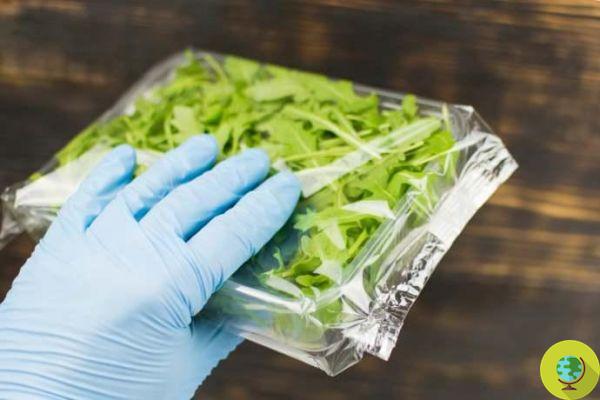
German researchers have shown that packaged salads can also include antibiotic-resistant bacteria.
Don't store avocado like this: it's dangerousAntibiotic Resistant Bacteria in Packaged Salads. Here's how to defeat them
Probably the most favorite side dish, also because there are really all kinds of salads. Many, instead of taking them loose from the greengrocer, prefer to buy salads already cut and packaged in bags from the supermarket shelves. But how safe are they?
Well, while it is already known that these types of fresh produce can be contaminated with hygiene-relevant bacteria, a working group led by Professor Kornelia Smalla of the Julius Kühn Institute (JKI) in Germany has now shown that these bacteria can also include antibiotic resistant bacteria.
These are found in manure, sewage sludge, soil and water bodies. “The worrying detection of this type of bacteria on plants is in line with similar results for other foods - explain from the German Federal Institute for Risk Assessment (BfR). We are urgently evaluating what this discovery means with regard to the health risk of consumers “.
In short, at the base of a salad bag, there could be not only the salmonella risk which in the past has already affected several products of the same kind. And not only that, this could apply to all types of vegetables that can be eaten raw.
A systematic review
To carry out the analyzes, the working group bought mixed salads, rocket and coriander from German supermarkets. The samples were tested to determine the total amount of transferable antimicrobial resistance genes (researchers use the term "transferable resistome") in Escherichia coli, a mostly harmless intestinal bacterium, on these foods. In their analyzes, the experts focused on the part of the Escherichia coli bacteria that are resistant to the active substance tetracycline. This is because tetracycline antibiotics are used in livestock farming, where they can promote the development and propagation of resistant bacteria in organs such as the intestines. These bacteria and some of the antibiotics are excreted and then find their way to the fields through organic fertilizers such as manure.
The researchers say that “the results of the comprehensive tests clearly show that a wide variety of transferable plasmids - carriers of the gene in bacteria that occur outside the chromosomes - have been found with resistance genes in E. Coli from fresh produce, resistance to multiple classes of antibiotics, E. coli bacteria with these properties were found on all three foods analyzed ”.
If these harmless bacteria get on plant foods, they can enter the human intestine via their own consumption of raw vegetables. Once ingested, the bacteria can transmit their plasmids to any pathogenic bacteria that may be present in the gut. This is known as horizontal gene transfer, which in nature allows bacteria to quickly adapt to changing environmental conditions. If a patient is treated with antibiotics, bacteria that have incorporated this type of transferable resistance genes into the genome have an advantage and multiply more than their less well-equipped "competitors". Due to the low level of contamination of the salad with E. coli, it is not known how often resistance genes are transferred into the human intestine. There is also little knowledge about whether and to what extent diseases are caused by these resistant bacteria.
Advice? It always remains that of wash raw vegetables, salads and fresh herbs thoroughly with drinking water before eating to minimize the risk of ingesting pathogens or antimicrobial resistant bacteria.
Pregnant women and people with compromised immune systems due to advanced age or taking medications should refrain from eating prepackaged and packaged salads as a precaution against food infections and should instead prepare the salads themselves using fresh and carefully washed little ingredients. before consumption.
Read also
- Salad in a bag, convenience rhymes with quality
- Salads in bags, the law arrives that guarantees hygiene and freshness
Germana Carillo


























